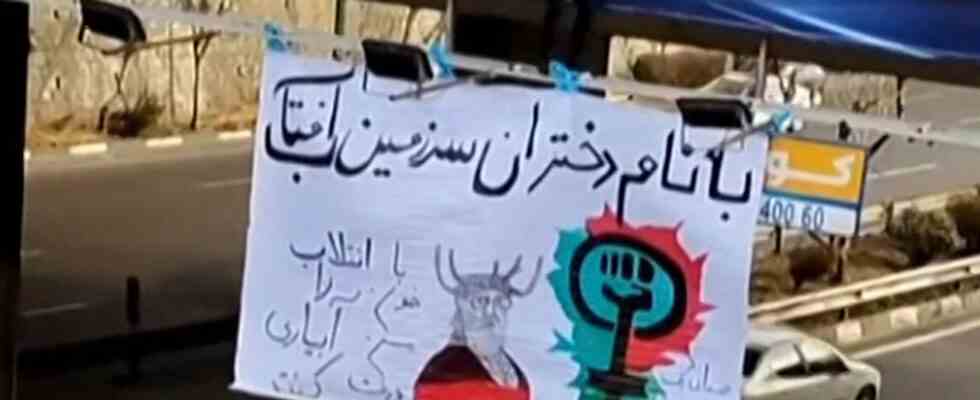Status: 01/14/2023 05:55 a.m
In Iran, the arrests and trials of dissident demonstrators are not decreasing. That can’t stifle the protest. A realization of those affected: Public pressure can work – and international help.
Executions in Iran take place in the early hours of the morning, just after the azan, the call to morning prayers. For weeks now, many Iranians have been picking up their cell phones with an anxious question: has another death sentence been carried out?
Four demonstrators have been executed since early December, most recently last weekend – all young men whom the regime accused of injuring or killing emergency services. Human rights organizations, on the other hand, speak of show trials, far removed from the basic principles of the rule of law.
Sponsorships should protect
Lists are circulating online with the names of demonstrators who have been sentenced to or are threatened with the death penalty. On social media, activists from various European countries mediate political sponsorships to members of parliament, including in Germany. They in turn write to the Iranian authorities, demanding releases and legal assistance, and lobbying. More than 250 politicians have now taken on such a sponsorship.
“The regime is asking families of prisoners to be quiet and not to speak publicly,” says Mariam Claren, one of the organizers in Germany. Her mother, Nahid Taghavi, has been a political prisoner in Tehran’s Evin prison since autumn 2020.
Claren is of the opinion that being loud, creating publicity, protects those affected, she had this experience in the fight for her mother. “That’s why it’s particularly important that politicians use their influence and reach.”
Loud protest with effect
The case of two young Iranians whose execution, according to activists, was imminent a few days ago shows that the regime could allow itself to be impressed by public pressure.
According to eyewitnesses, crowds then gathered in front of the prison in the city of Karaj, north-west of Tehran, and loudly protested against the impending executions. So far they have not been enforced.
journalists under pressure
Meanwhile, the government continues to crack down on journalists. Reporter Nassim Sultan Beygi is said to have been arrested at Tehran airport in the middle of the week. Later, the message appears that she was taken to the notorious Evin prison and is being held in solitary confinement.
The NGO Committee for the Protection of Journalists has counted almost 90 arrests of journalists since the protests broke out in September 2022 after the death of the young Kurd Jina Mahsa Amini.
Because a headscarf was worn too loosely, the 22-year-old was arrested by the vice squad. She died in prison. Activists and the family blame police violence, but the state denies it.
Arrived in everyday life
Since then there have been protests in Iran, for a long time violently and loudly on the streets, but now the protest has found its way into everyday life for many Iranians. This also includes the fact that in many cities women no longer wear their headscarves. Knowing full well that this can continue to put her in great danger.
Just this week, the Attorney General instructed the authorities in the country to take much more decisive action against violations of the Islamic dress code. New surveillance technology, such as video cameras in public spaces based on the example of China, a close ally, is constantly being discussed.
The monitoring is already being implemented in traffic: women who drive without a headscarf are identified via the number plate and fines are sent to them via SMS.
Will there be more sanctions?
In the course of the developments, European politicians are again discussing sanctions against Iran. Foreign Minister Annalena Baerbock announced on Twitter that the pressure would primarily be increased on the Revolutionary Guard – the elite military unit that is both an economic empire and guardian of everything that happens in the Islamic Republic.
Because of her, the EU and the federal government were repeatedly criticized. Opposition and activists are demanding classification as a terrorist organization, as in the United States. Before the “listing” but legal hurdles would have to be taken, argues Baerbock. Contact was made with the EU to clarify the requirements.
Almost paradoxically, a report from the Chamber of Industry and Commerce appeared just one day after Baerbock’s statements: Germany will also be Iran’s most important trading partner in Europe in 2022.

